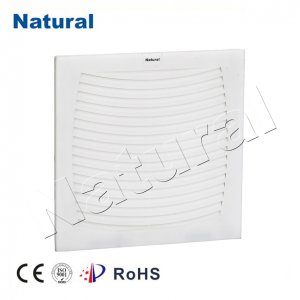In today’s rapidly evolving technological landscape, electronic devices and equipment play a crucial role in various industries. From manufacturing plants to data centers, these machines often operate in demanding environments where temperature control and dust management are paramount. This is where enclosure fan filters step in, serving as a shield against external contaminants and a catalyst for enhanced equipment performance and longevity.

The Role of Enclosure Fan Filters Enclosure fan filters, as the name suggests, are protective components installed in electronic enclosures or cabinets. Their primary function is to prevent the intrusion of dust, dirt, debris, and other particulate matter into the sensitive internal components of the equipment. By creating a barrier against these potential contaminants, fan filters help maintain a cleaner and more controlled environment within the enclosure. Benefits of Using Enclosure Fan Filters Improved Equipment Longevity: Dust and debris can accumulate on electronic components over time, leading to overheating and reduced efficiency. Enclosure fan filters act as a safeguard, ensuring that the internal parts remain clean and free from potential damage caused by these elements. This, in turn, extends the lifespan of the equipment. Enhanced Performance: Electronic devices generate heat during operation. Proper ventilation is essential to dissipate this heat and prevent overheating. Fan filters facilitate the airflow within the enclosure, allowing hot air to escape and cool air to enter. This improved air circulation helps maintain optimal operating temperatures, which directly contributes to the equipment’s overall performance and reliability. Reduced Downtime and Maintenance Costs: Without adequate protection, dust and contaminants can lead to malfunctions and unexpected downtime. Regular cleaning and maintenance become time-consuming and costly. By employing enclosure fan filters, the need for frequent cleaning is significantly reduced, leading to lower maintenance expenses and uninterrupted operation. Environmental Compatibility: Many industries, such as manufacturing and pharmaceuticals, require controlled environments with minimal dust and particle contamination. Enclosure fan filters help meet these stringent requirements by ensuring that the equipment operates within specified cleanliness standards. Energy Efficiency: When electronic components are exposed to excessive heat, they become less energy-efficient. By maintaining proper temperatures, enclosure fan filters indirectly contribute to energy savings by promoting optimal equipment operation. Choosing the Right Enclosure Fan Filter Selecting the appropriate fan filter for a specific application is crucial to maximize its benefits. Factors to consider include filtration efficiency, airflow capacity, and compatibility with the equipment. High-quality fan filters are typically designed with durable materials that can withstand the rigors of various environments while effectively filtering out particles of different sizes. Installation and Maintenance Installing enclosure fan filters requires careful consideration of airflow direction and placement to ensure optimal cooling. Regular inspection and cleaning of the filters are essential to maintain their effectiveness. Depending on the environment, filters may need replacement periodically. However, the frequency of replacements is notably lower than the potential maintenance required without these protective components. Conclusion In the world of electronics, where precision and reliability are paramount, enclosure fan filters play a vital role in ensuring equipment longevity and efficient operation. By shielding sensitive internal components from dust and contaminants, these filters contribute to reduced downtime, lower maintenance costs, and enhanced overall performance. As technology continues to advance, the importance of enclosure fan filters in safeguarding our critical equipment cannot be overstated.